@wuzhimang
2016-08-31T01:03:28.000000Z
字数 37198
阅读 11815
新思维语法初级 Cookbook
English
1. 名词可数与不可数
- junk
- 不可数, 垃圾、旧货、毒品: junk mail, junk food, junk shop
- 可数, 中国式帆船,a Chinese sailing boat:
junks
误区
- 误区一,用中文思维来理解英文名词的可数与不可数
- money, furniture, luggage 均为不可数
- 误区二,死记名词的可数与不可数,没有从英语思维的角度来理解名词的可属性
规律
一、不可分隔的物质与可分隔的个体物品
物质名词表示个体物品时转化为可数名词
名词表示物质时是不可数,表示物品时则可数
不可分隔或分隔后各部分与原先整体无本质差别,此时名词为不可数名词- air 空气
- Let's go out and
get some fresh air. 让我们出去呼吸些新鲜空气 live on air:喝西北风过日子,饿肚子过活walk on air: 感到飘飘然,得意忘形,得意洋洋
- Let's go out and
- air 指人的外表、神态、气质或者周围环境的氛围、气氛。此时air前要加不定冠词an
- There was
an air of tensionat the meeting. an air of mystery: 神秘的样子- He has an air of mystery.
- John
set abouthis task withan air of quiet confidence. 约翰自信地开始了自己的工作
- There was
- airs 装腔作势、摆架子,
put on airs,give oneself airs
- John is always putting on airs/giving himself airs.
- paper 纸(不可分割,分割后还是纸)不可数,papers,作为个体的物品,如“报纸、论文或考卷”可数
- A piece/
sheet of paper - We send to China litle pieces of paper for their goos.
Academic papers: orginal or recycled? 原创、抄袭
- A piece/
- glass 玻璃, 玻璃杯
- glass does not
rustor not - He broke a glass.
- She drank two glasses of wine.
- This
vaseis made of glass. - He broke a piece of glass.
- He broke
a pane ofglass. 他打破了
- glass does not
- air 空气
- 物质名词表示物质种类时转化为可数名词
- milk
- I don't like milk...
- ... other
fermentedmilks... 名词读作ˈfɜːmɛnt,动词读作fəˈmɛnt
butter
- There are serval new butters being produced without milk.
- milk
- 液体或固体物质带有“几瓶”或“几块”含义时转化为可数名词
- tea, water, beer, coffee
- Table 5 wants an iced tea and
a water. 一杯,一瓶 - Two beers and three coffees, please. 几瓶
- Table 5 wants an iced tea and
- cake
- I like a cake, not
hamburger. - My mother is making a cake in the kitchen.
- Would you like a cake? No, I don't like cake.
- I like a cake, not
- tea, water, beer, coffee
肉食物质转化为动物时变成可数
- chiken /
lamb羔羊、羔羊肉 [læm] - goat --> mutton;
bull/cow--> beef;pig/sow--> pork; 一般都是不同的 - dog 代指狗肉(西方没有狗肉)
- He said that dog tasts best when it cookied with
ginger. /ˈdʒɪndʒə/
- He said that dog tasts best when it cookied with
- chiken /
常见的个体物品,在特殊情况中可以转换成物质名词而不可数
- A bag of apples
- A
teaspoonof apple 一勺子苹果 (由有大小、形状的物质名词物品转化为无形状、无大小的物质)
- He fed the baby a teaspoon of apple. 一勺子苹果
其他常见的物质名词转化,参考课本第10页内容
air, blood, bread,butter,cholesterol,coffee, electricity,galss, meat,milk, oil,paper,pork,poultry, soup,tea, thunder,water,wine,yogurt
错题[1]
1. There's (milk, milks) in the fridge.
2. I want to make a list. I need (a paper, some paper, some papers)
3. I don't like (coffee, a coffee) without (milk, a milk)
4. I perfer (coffee, a coffee) to (milk, a milk)
5. I use (toothbrush, a toothbrush) to clean my teeth. I clean my teeth with (toothpaste, a toothpaste).
二、不易数的物质与轻易可数的个体物品
- 有些名字在理论上是可分割,是可数的,但因为其组成部分太小而不容易数清,这样的名词在英文中被看做是不可数名词。
- hair,几根时则可数
She has beautiful long hair.
She has a beautiful long hair. (光头)
A: I'm goingbaldand I only have a few hairs. [bɔːld]
B: I don't have much hair. I'd like to buya wig/wɪɡ/
A: Certainly, sir. That's $50 plus tax.
Forget thetacks. I'll useglue. /tæk/
Not a hair was out of place.表示外形十分整洁、干净
There are some white hairs on your head. 你头上有几根白发。
Waiter, there is a hair in mysoup!
The dog has left white hairs all over the ground of the house.
win by a hair险胜
hang by a hair千钧一发,岌岌可危,摇摇欲坠
split hairs在琐碎的问题上争辩,钻牛角尖
Let's stop splitting hairs and get back to the main issue. - 其他的,见第11页,如
corn, popcorn, sand, grass, snow, rice, salt,sugar
Do you take sugar in your coffee?
How many sugars do you want in your coffee? 几勺糖
I likesugars. 我喜欢“甜食”,(可数)
Can I have twosugars, please. 来两勺糖,两块甜食?
- hair,几根时则可数
错题[2]
1. She has (blonde hair, a blonde hair, blonde hairs). /blɒnd/
2. Your (hairs, hair is) too long. You should have (them, it) cut.
3. Are you hungry? Would you like some (sugar, sugars, a sugar) with your coffee?
4. There's (sand, a sand, sands) in my shoes.
brown eyes黑眼睛; black eyes 青肿的眼眶
三、抽象概念与具体物品
- 抽象不可数-->具体可数
- time
- There's no time to lose. 抓紧时间
- How time flies! 时间过得真快
- It can stand the test of time. 经得住时间的考验
- Have a wonderful time! A long time ago! (“一段时光”,可数,往往有形容词修饰)
TIME Magazine时代杂志,Times Square时代广场a youth,a full-grown man/juːθ/

- Youth 作为“青春”不可数,
Youth is not a time of life. It is a state of mind.青春不是年华,而是心境 《青春》 perpetual,fountain,hitch your wagon to a star,redeemed/pəˈpɛtjʊəl/ /ˈfaʊntɪn/ /ˈwæɡən/
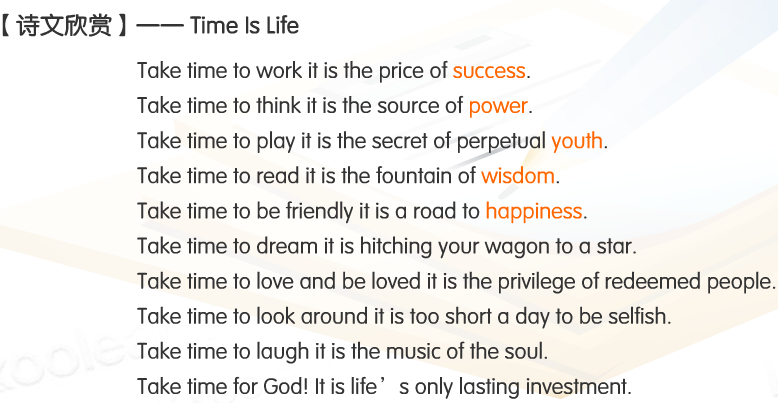
- death
- Most people are afraid of death.
- Do you believe in life after death?
- He might have
died a sudden death, but Jackson leaves us with a musiclegacyfor the ages. 突然去世(具体死亡的用例) /ˈlɛɡəsɪ/ die a natural death寿终,得终天年die a violent death横死die a horrible/terrible death死的很惨die a hero's death英勇牺牲/像英雄那样死去die a dog's death悲惨的死去- 后面加s,表示“具体死亡人数”
the number of deaths Deaths from lung cancer肺癌死亡人数
- beauty “美丽”, “美人”
- She had great beauty in her youth.
- She was a beauty in her youth.
- art “艺术”, “技术、技艺、技能"
- modern European art
Knittingis an art. 编制是一门技艺
- time
- 具体可数 --> 抽象不可数
- room “房间”,“空间、余地”
- There's plenty of room for everyone to sit down in this room.
- You can
ride with us. There's encough room in my car. 你可以搭我们的车一起走 standing room, There is no seat now. It's standing room only. 没有座位了,只有站票
- area “地区”可数,“面积”可数/不可数,如果指某个地方的具体多大“面积”,则是可数;作为一个抽象概念(以区别其他的概念比如“人口”)/ˈɛərɪə/
- The
squarecoversan area of20,000square meters. - Shanghai is the largest city
in areain China,Beijing is the largest city in population.
- The
- husband/wife --> 不可数,表示“夫妻”概念
- Minister: I pronounce
this couple to be husband and wife. You may kiss. - We had
a husband and wife Barber shopon campus. 夫妻店 - We are not
boyfriend and grilfriend. 男女朋友关系
- Minister: I pronounce
- dog 表示概念时,不可数
It's dog eat dog. 残酷的无情的竞争。Show businessisn't allglamour; it's dog eat dogout there. 娱乐业...其中的竞争十分残酷 /ˈglæmə/- Advertising is a
dog-eat-dogbusiness. 广告业竞争十分残酷
- horse
- This character for horse is the 13th common
family namein China. 马姓是第13... prodigyhypothesis/ˈprɒdɪdʒɪ/ /haɪˈpɒθɪsɪs/

- This character for horse is the 13th common
- room “房间”,“空间、余地”
错误[3]
1. Enjoy your holiday! I hope you have (a good weather, good weather).
flat 公寓(英); apartment(美)
a spare room 备用的房间 /spɛə/
- You can't sit here. There isn't (a room, room)
John has done many intersting things. He should write a book about his (experience, experiences)
... cause many deaths... 死了很多人
Wish you success and happiness 祝你成功和幸福
This plan wasa success. 这个计划成功了Do you speak any (language, languages)?
speech “说话的能力” 不可数, Only humans are capable of speech. “演说”则是可数
四、总称概念与个体物品
- 总称名词和个体名词不同的表达
- furniture, the furniture 这些家具
mattress床垫,wardrobe衣柜,rocking-chair摇椅,an imposing bookcase气派的书柜 /ˈmætrɪs/ /ˈwɔːdrəʊb/spaghetti意大利面,lipstick口红,rouge胭脂,nickels五分硬币,dimes十分硬币,pedicabcabinetsbracelets/spəˈɡɛtɪ/ /ˈlɪpˌstɪk/ /ruːʒ/ /daɪm/ /ˈpɛdɪˌkæb/ /ˈkæbɪnɪt/ /ˈbreɪslɪts/
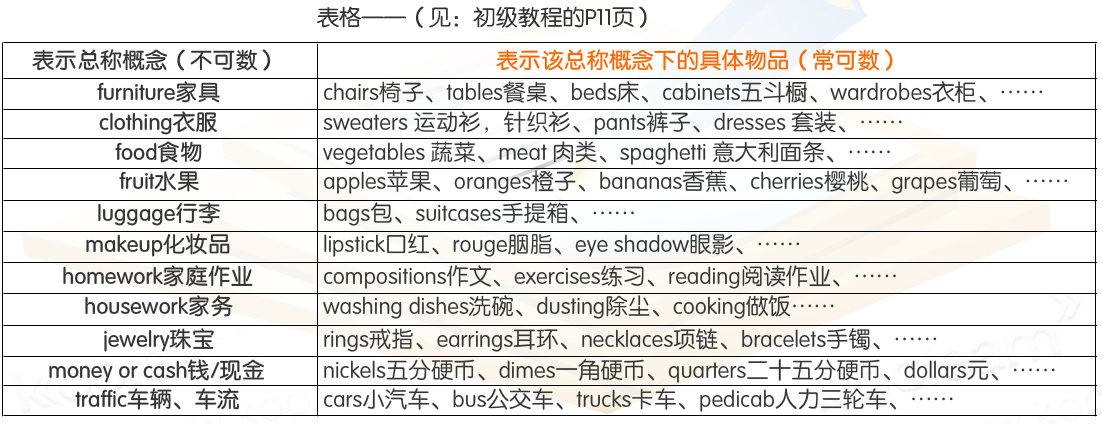
- 查字典看看英文单词正确的定义,如
traffic“流”, 只能充当“总称名词” --> furniture, clothing, luggage, makeup, homework, housework, jewelry , traffic /ˈdʒʊəlrɪ/
- furniture, the furniture 这些家具
- 总称名词和个体名词变化的表达
- machinery --> machines
- poetry --> poems 诗歌 /ˈpəʊɪm/
- scenery --> scenes, scenic spots /ˈsiːnərɪ/
- character 特点 --> characteristics
- character作为可数,便是“方块字”或者不同“人物”
- a Chinese character
a man of character有个性的人construct the socialism with Chinese characteristics建设有中国特色的社会主义
- 有些总称名词,当表示不同种类的物种时,可转化为可数名词,如food, fruit
总结
- 结合语境 (things or people ?)
- A loud cracking noise. 巨大的爆裂声
- Stop making so much noise. 别吵闹了

2. 分析 garlic /ˈɡɑːlɪk/
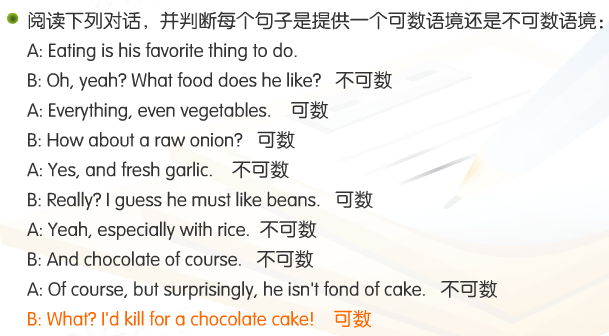
错题[4]
1. Do you hear (a noise, noise) now?
I don't like to
wearlong hair/bread. 我不喜欢留着长发(胡须) /spɛə/
You canput upthis evening, we have a spare room. 你今晚可以在这留宿,我们有一个备份的房间
light 指“灯”是可数的,There is a light on inside. “光”是不可数
- I open the letter and it contained an important ( - , piece of)information
There are serval pieces of funiture in this hall.
My favorite sports are tennis and swimming.
Death and all this homework, all this furniture
We had very good weather while we were on holiday.
What a beautiful view <--> What beautiful scenery! /ˈsiːnərɪ/
I don't drink coffee very often.
I'm going out for a walk. I need some fresh air.
2. 名词单数与复数
规律
一、只用单数
- 专有名词 China, American,
The Americans - 不可数名词 news, mathematics, politics, gymnastics, athletics
- coffee
二、只用复数
- “二合一”复数名词
- glasses/spectacles, binoculars, scales, clippers, forceps, pincers, tongs, tweezers, scissors, shears
- jeans, trousers, shorts, briefs, slacks, stockings, socks, trunks/swimsuit/swimwear, pajamas
- 单行复意
people,police, cattle/poultry家禽, livestock, fish - 特定含义的复数名词
- 单复数都有,且含义一样,但一般用复数 congratulations, thanks, greetings, regards, winnings, earnings/savings, workings, belongings, surroundings
- 单复数都有,但变复数后含义不一样 arms, quarters, spirits, customs, securities, lines, letters, damages, premises, spades, hearts, clubs, diamonds
三、可单可复(词形相同)
- 动物名称
deer, sheep, cod, bison, salmon, grouse, quail- fish 比较特殊
- shrimp(s), reindeer(s)
- 国家名称(国籍)
Chinese, Japanese, Lebanese, Portuguese, Vietnamese, Swiss, British - 其他
means, series, aircraft, spacecraft
grass, cattle, sheep
四、可单可复(词性不同)
☆ 规则名词
- 词尾加-s:清辅音 读 s、浊辅音和元音读 z, ʃ、tʃ、dʒ、s 读 iz
- -s, -x, -ch, -sh 加-es
- the servant and the matches
- The matches you bought for me lately were very bad; go and get some better
ones - Why, you stupied fellow, these
matchesare all burned! What have you been doing to them - 以-ch结尾的名词,若发/k/,则加-s
- stomach/stomachs
monarch/monarchs帝王 /ˈmɒnək/
- The matches you bought for me lately were very bad; go and get some better
- the servant and the matches
- 辅音 + y 变-y为-i再加-es; 元音 + -y结尾,则加-s
- play/plays, boy/boys, guy/guys, donkey/donkeys, monkey/monkeys, key/keys
- 以-o结尾
- 加-es,以辅音字母加-o结尾的:tomato/tomatoes; hero/heroes;
Negro/Negroes黑人;veto/vetoes否决; /ˈniːɡrəʊ/ /ˈviːtəʊ/ (vote) - 加-s:以辅音字母加-o结尾的外来词或缩写词,以元音字母加-o结尾的名词,变复数时加s
- photo/photos,photograph
kilo/kilos, kilogrammemo/memos, memorandum /ˌmɛməˈrændəm/- piano/pianos,
solo/solos独奏曲, soprano/sopranos 女高音歌手,dynamo/dynamos发电机;kimono/kimonos和服;tobacco/tobaccos烟叶 (外来词) /ˈsəʊləʊ/ /səˈprɑːnəʊ, -ˈpræn-/ /ˈdaɪnəˌməʊ/ /kɪˈməʊnəʊ/ /təˈbækəʊ/ - zoo/zoos, radio/radios 收音机,
bamboo/bamboos竹子,studio/studios演播室、工作室,cuckoo/cuckoos布谷鸟,杜鹃鸟 /bæmˈbuː/ /ˈstjuːdɪˌəʊ/ /ˈkʊkuː/
- 加-es 或者 -s都可以
memento/memento(e)s纪念品 [mɪ'mentəʊ]motto/motto(e)s座右铭 /ˈmɒtəʊ/- volcano/volcano(e)s 火山
manifesto/manifesto(e)s宣言 /ˌmænɪˈfɛstəʊ/
- 加-es,以辅音字母加-o结尾的:tomato/tomatoes; hero/heroes;
- -f,-fe结尾的
- 变f,fe为v,再加-es
calf/calves 小牛, half/halves, knife/knives, leaf/leaves, life/lives 生命,loaf/loaves 一条、一直,sheaf/sheaves 一捆、一束, shelf/shelves, thief/thieves, wife/wives, wolf/wolves; /kɑːf/
- 直接加s
- belief/beliefs 信仰;chief/chiefs 首领;
cliff/cliffs 悬崖;proof/proofs 证据;reef/reefs 暗礁; roof/roofs 屋顶; safe/safes 保险箱; /riːf/ -->信仰首领、悬崖暗礁、屋顶上的保险箱藏有证据 - 少数-s, -ves均可 -->
码头上的侏儒,蹄上拿着围巾和手帕,连个都拿了,真贪心 - 少数-s, -ves均可
dwarf/dwarfs/dwarves 矮子、侏儒 /dwɔːf/handkerchief/handkerchiefs/handkerchieves 手帕 /ˈhæŋkətʃɪf/kerchief方头巾 /ˈkɜːtʃɪf/hoof/hoofs/hooves蹄 /huːf/scarf/scarfs/scarves 围巾 /skɑːf/wharf/wharfs/wharves 码头 /wɔːf/
- belief/beliefs 信仰;chief/chiefs 首领;
- 变f,fe为v,再加-es
☆ 不规则名词变复数
- 以
-a结尾的拉丁语词 -->-ae或-as
alumna/alumnae女校友 [ə'lʌmnə] / [ə'lʌmni:]
alumnus/alumni男校友 [ə'lʌmnəs] / [ə'lʌmnaɪ]The Alumni Association校友会Alma Mater母校 [ælmə meitə:]
alga/algae/algas水藻 ['ælɡə] [ˈældʒiː]antenna/antennae/antennas天线 [æn'tenə] [æn'teniː] 天线 /antennae/formula/formulae/formulas公式 ['fɔ:mjuli:]
- 以-ex或-ix结尾的拉丁词 --> 直接加-es或者把-ex,-ix变为ices
index/indices/indexes索引 [ˈɪndɪˌsiːz] ['indeksis]apex/apices/apexes顶点、最高点 /ˈeɪpɛks/ /ˈæpɪˌsiːz, ˈeɪ-/ /ˈeɪpɛks/appendix/appendices/appendixes附录、阑尾 /əˈpɛndɪks/ /əˈpɛndɪsiːz/
- 以-sis 希腊语名词变-ses, is为-es
crisis/crises危机 ['kraɪsɪs] ['kraɪsiːz]
- The Chinese word for crsis is divided into two characters, one meaning danger and the other meaning opportunity.
- a
subprimecrisis 次贷危机 --> /ˈsʌbˌpraɪm/ - an finacial crisis 金融危机
- an economic crisis 经济危机
- crisis of confidence 信任危机
- crisis of
conscience精神危机,信仰危机 --> /ˈkɒnʃəns/ - identity crisis 身份认同危机
analysis/analysesbasis/bases- diagnosis/diagnoses --> [,daɪəɡ'nəʊsiːz]
- thesis/theses
- hypothesis/hypotheses 假说、推断
- 以on或um结尾的名词,变-on或-um为-a或有的可在词尾直接加-s
datum/data/ˈdeɪtəm, ˈdɑːtəm/medium/media/mediums: 媒介,介质
- strike a happy medium 采取中庸之道,采取这种办法。John was neither too friendly nor too formal, but struck the happy medidum
- medium 为“巫师,通灵人”,复数为 mediums
- mass media 大众传媒
bacterium/bacteria细菌memorandum/memoranda/memorandums备忘录 --> [memə'rændəm] [,mɛmə'rændə]erratum/errata错误, 错误勘误表 --> [e'rɑːtəm] [e'rɑːtə]/ɪˈrɑːtəm/criterion/critereia/criterions标准 --> [kraɪ'tɪərɪən] [kraɪ'tɪərɪə]phenomenon/phenomena现象 --> [fɪ'nɒmɪnən] [fə'nɒmɪnə]
- -oo- 变为 -ee-
- foot/feet, tooth/teeth, goose/geese 鹅 --> [ɡiːs]
goose bumps / goose pimples鸡皮疙瘩, bump “突出物” --> /ˈpɪmpəl/sth gives sb goose bumps或者sb get goose pimples- The movie was so scary that it gave me goose bumps.
- Whenever I hear a scary story, I get goose pimples.
- Air conditioning always gives me goose pimples. 一开空调,我就其鸡皮疙瘩
- When he
proposed tome with the ring I got goose bumps. 拿着戒指向我结婚 kill the goose that lays the golden eggs杀鸡取卵 luan --> /ˈɡəʊldən/- It's too soon to sell those sockets yet. You'll just be killing ....
goose egg零分- It was
a tie game. Both teams ended up with goose eggs. - I got a goose egg in my first exam.
- foot/feet, tooth/teeth, goose/geese 鹅 --> [ɡiːs]
- -ouse 变为 -ice
louse/lice虱子 --> /laʊs/ /laɪs/mouse/mice老鼠(小)rat/ræt/ 老鼠(小) --> 感情色彩不一样 Micky Mouse 米老鼠;mouse 胆小的人, rat 卑鄙的人,叛徒
as quiet as a mouse非常老实- Do you think John is sick? He's been quiet as a mouse all day today.
- The children are quiet as mice now.
as poor as a church mouse像教堂里的老鼠一样穷- He was as poor as a church mouse, but he is a
billionarienow. /ˌbɪljəˈnɛə/ look like a drenchwoned rat落汤鸡 --> [drentʃd]like rats deserting the sinking ship树倒猢狲散smell a rat奇怪、可疑- They know we hate them and will smell a rat if we try to be nice to them.
- 以-us结尾的拉丁词语,变-us为-i或在直接加-es
alumnus/alumnigenius/genii/geniuses/ˈdʒiːnɪˌaɪ/stimulus/stimuli刺激物nucleus/nuclei/nucleuses原子核 /ˈnjuːklɪəs/ /ˈnjuːklɪˌaɪ/- bacillus/bacilli 杆菌 /bəˈsɪləs/ [bə'sɪlaɪ]
cactus/cacti/cactuses仙人掌 /ˈkæktəs/ ['/ˈkæktaɪ]əs/ /ˈkæktəs/
- The cactus has spines. 仙人掌有刺 /spaɪn/
fungus/fungi/funguses真菌 /ˈfʌŋɡəs/ /ˈfʌŋɡaɪ, ˈfʌndʒɪ/edible fungi食用菌
-
☆ 复合名词变复数
- man/woman + 名词 --> 两词均变复数 --> [mæn] [men]
- man teacher/men teachers; man servant/men servants 男仆;
woman pilot/women pilots 女飞行员;woman journalist/women journalists 女记者 /ˈpaɪlət/
- man teacher/men teachers; man servant/men servants 男仆;
- 以-man/-woman/-child结尾的词语 --> -men/-women/-chilren --> [men]
- fireman/firemen 消防员
- chairwoman/chairwomen 女主席
- horseman/horsemen 骑兵
- grandchild/grandchildren 孙儿/女
Englishman/Englishmen英国人(男)Frenchman/Frenchmen法国人(男)German --> Germans这不是合成词
- 名词+介词或介词短语, 构成复合名词 --> 主体名词(中心名词)变为复数
comrade-in-arms/comrades-in-arms战友 /ˈkɒmreɪd/ 同伴mother-in-law/mothers-in-law岳母、婆婆runner-up/runners-up亚军passer-by/passers-by过路滤人looker-on/looker-on旁观者bride-to-be//brides-to-be即将成为新娘的人editor-in-chief/editors-in-chief总编辑
- 由短语动词演变成的 --> 结尾加-s
grown-up成人,forget-me-not勿忘我(草),go-between中间人, take-off 起飞,close-up特写镜头,sit-in静坐抗议,stand-by可以信任的人- babysitter 保姆, breakdown 崩溃、衰落, takeover 接管、收购
- 名词+形容词 --> 名词后变复数
secretary general/secretaries general秘书长 --> /ˈsɛkrətrɪ/Attorney General/Attorneys General 【英】总检察长、【美】司法部长,大法官 --> /əˈtɜːnɪ/ 律师consulgeneral/consuls general 总领事 --> /ˈkɒnsəl/notary public/notaries public` 公证员 --> /ˈnəʊtərɪ/
总结

work
1. work “工作” 不可数, 只有单数
2. work “(文学、会话、雕刻等)”艺术品” --> 第4类
- a work of art, two works of art 一件艺术品
- the works of modern artists 现代艺术家作品
- works
3. works “工厂” --> 单复数同形 a works, two works
- steelworks 炼钢厂, brickworks 砖厂, ironworks 钢铁厂, gasworks 煤气厂
- DreamWorks 梦工厂
4. workings “运动方式、活动方式”
- I shall never understand the workings of a woaman's mind。我永远搞不懂女人脑子里在想什么
5. work 工作, a work 一部作品, a works 一个工厂, two works 两部步作品/两个工厂
6. works 还表示“一项规模浩大的工程”
- engineering works 工程建筑
- road works 筑路工程
- road widening works 扩路工程
- road resurfacing works 重铺路面工程
- irrigation works 水利建设 或 灌溉工程
- great works 浩大的工程
-
3. 冠词
思维导入
- a
- the 40th anniversity of the moon landing 登月40周年纪念
- 成年男子 An dault male human being 一般要加冠词 a 修饰,
a man,man-->全人类(The human race; mankind) - “That's one small step for a man, one giant leap for mankind”
- the
- The U.S. party should completely accept the blame for it. It is out of the question! 应负责任
out of the question不可能out of question毫无疑问
I'm not a big, fat panda. I'm the big, fat panda.(he lifts up his pinky finger) /ˈpɪŋkɪ/ (知名的,有名的, 注意读音)鼎鼎大名
- The U.S. party should completely accept the blame for it. It is out of the question! 应负责任
冠词有几个
- the 辅音前 ðə, 读元音前读 ði 共四个
- a, an 的使用和音素有关 /ən, æn/
a university; a unique person- an unkind old lady 注意连读
- an hour; an honor
- An apple a day keeps the doctor away. 一天一苹果,医生远离我! 富兰克林
- An egg a day keeps the ax awasy!
- What a difference an "a" makes! 一个a引出了多大的变化!
An SOS sign!- An L letter is in the word "letter"
- A C letter is int the word "count"
The MP = The Member of Parliament议员 前后the的读音不一样
- 口语中表示迟疑一下的时候,或者想强调下面一个词时, 即便这个词以辅音开头,前面的 the 也要读成 ði
- A: My name is James Bond. B: What, not the James Bond?
- Telling lies is a fault in a boy, an art in a lover, an accomplishment in a
bachelor, and second-nature in a married man. 说谎,是男孩的错误,情人的遗书,单身男人的技能,已婚男人的第二天性。 ['bætʃələ]
规律
一、不可数、复数、单数名词
- 在不可数、复数名词前可以不用冠词 --> 零冠词
- 名词角度
- 不可数: the 或 零冠词
- 复数: the 或 零冠词
- 单数: a/an 或 the --> 决不能单独出现, 必须有冠词、限定词
- I love music... I don't like the film, but I like the music.
- I usually like dogs, but the dogs next door are too dangerous.
- A tiger is a dangerous animal... The tiger is a dangerous animal
冠词角度
- a/an 只能限定单数名词
- 定冠词 the 各类名词都可限定
- 零冠词 只可能限定在不可数、复数名词
泛指、特指
- 冠词和其他限定词的关系 --> a 和 one, this; 与 some 的关系等
二、冠词的泛指
不可数名词不加冠词
- life
- Life is hard sometimes.
- Life is education in itself.
- The writer is writing a book about the life of blacks in America.
- I am studying the life of Beethoven. 我正在研究贝多芬的生平。
- A Complaint Free World 《不抱怨的世界》
- Life is not fair - get used to it . Just remember, never complain!
- air
- Air is a
colorlessand tasteless gas. 泛指空气这种物质 - The air in this room is stuffy. Please open the windows. 特指房间里的空气
- Air is a
- sugar
- Sugar isn't very good for you.
- Can you pass me the sugar, please?
- Hydrogen is lighter than oxygen.
- Water is essential for life.
- Life without music would be nothing.
Necessity is the mother of invention.- Happiness is often the product of honesty and hard work
Theory must go hand in hand with practice.理论和实践相结合
- life
复数名词不加冠词
- book
- Books fill leisure time for many people.
- Put away the books on your desk. 把你桌子上的书摆放好
- Move the books off that chair and sit down.
- tiger
- The tigers are sleeping in the cage.
- Tigers are dangerous animals.
- pencil
- Pencils contain lead.
- Who put the pencils on the table?
- I like pigs. Dogs look up to us. Cats look down on us. Pigs treat us as equals. (Winston Churchill) --> ['tʃə:tʃil]
- Televison is not real life. In real life people actually have to leave the coffee shop and go to jobs. (Bill Gates)
- Bananas are yellow.
- Cigarettes are bad for your health.
- Young babies need a lot of sleep.
- Wolves are
carnivorous. 食肉类动物 --> /kɑːˈnɪvərəs/
the 泛指
- the + 国籍名词:一个国籍的、一个种族集团的人民。The Chinese are a great people. 仅局限于以-ese、-sh、-ch结尾的国籍。 British,
Dutch - the + 形容词 表示一类人,表示泛指,相当于后面忽略了people。 the unemployed; the rich; the poor; the blind; the wise;
The poor are causing the nation's leaders great concern.
The emotionally disturbed and the physically and mentally handicapped need the aid of society.
- book
单数名词加the (结合语境分析泛指还是特指)
- The tiger is becoming almost extinct. Tigers are becoming almost extinct.
- The whale if the largest
mammalon earth. The whale is dead. [hweil] /ˈmæməl/
特殊的:man 表示泛指“人类”时,不能加 the
Man has been on this planet for over a million years.
Since time began, man has lived in fear of fire. 自古以来,人类就害怕发生火灾。
"man and woman" "man and wife" <--> "husband and wife" 不加冠词单数名词+a/an --> 某一类事物中任何一个具有代表性的成员
- a tiger/ the tiger/ tiger ....
- A teacher should be patient with his or her students.
- A growing child needs great nourishment. 长身体的孩子需要较多的营养
- A dog makes a good pet. 狗是一个很好的宠物
- The dog makes a good pet.
- Dogs make good pets.
Oil and water don't mix, but milk and sugar do. 油和水不能融合
Money can't buy happiness or health.
Why has the lightgone out?
Life is not possible without water.
I hate exams. (泛指)
Do you konw a shop that sells foreign papers.
三、定冠词的特指
- 特指:双方都知道的事物,就是特指 --> the <-- 说话者认为对方知道该事物
- What's making that noise? It's probably the dog next dog.
- 你我有一方不知道的事物 --> a/an
- What's making that noise? It's probably a dog outside. 可能是外面的狗吧
- 冠词 --> 双方决定的!
- The brick house on the corner is mine.
情景/文化特指 (situational/cultural reference)
- General facts
The North/South Pole;The Equator赤道;The universe宇宙;The sky; The moon --> [ɪ'kweɪtə]The moon goes around the earth which goes around sun.- The
Pacificis bigger than theAtlantic. 太平洋比大西洋大。 --> [pə'sɪfɪk] [æt'læntɪk] - 天气、气候 the weather, the climate, the atmosphere, the rain, the wind
- the public, the past, the future,
the travel industry - 如果不是泛泛而谈,而是表示具体类型的事物,则用不定冠词
We need an envirnoment free from pollution.没有污染的环境- What are your plans for the future? I dream of a future where I can spend most of my time writing books.
- The global climate is warming. Kunming has a wondful climate.
- 名词前有adj 表示具体类型,则一般用不定冠词。We can never expect a bluer sky unless we create a less polluted world.
Socioculturalknowledge --> [,səusiəu'kʌltʃərəl; -ʃi-]
the Pope罗马教皇 /pəʊp/the Renaissance(欧洲12-16世纪)文艺复兴 --> /rəˈneɪsəns/the Civil War美国南北战争- Albert Einstein, the famous physicist. --> ['ainstain] ['feɪməs]
- I'd like to introduce you to Jay Zhou, the singer. 我想介绍你认识一下周杰伦, 就是那位鼎鼎大名的歌星。
- Liu Xiang, the famous hurdler / the 110-meter hurdles world record holder /ˈhɜːdlə/ 那个...
- 英美背景、中国读者不一样! I'm the Wenfeng Shi... 读音 ði
- Specific knowledge
- I cleaned the
carpetyesterday. 地毯 ['kɑːpɪt] - Let's go to the library.
- I cleaned the
- Immediate situation
- These are the
pistons. 这些就是活塞 ['pɪst(ə)n]
- Where's the dessert?
- What dessert?
You were supposed to bring the dessert.你应该带来的甜点啊- I didn't know that. Nobody told me about it.
- These are the
上下文共指 textual co-reference
- 同一事物之间的指代 --> 第一次指代用a/an, 再次代指则用the
once upon a time从前I did a grammer course last year.我去年上了一门语法课。 do --> 学习a wedge of cheese一块奶酪 /wɛdʒ/ 楔形物- Last week a
tornadoripped througha small town in Texas. 袭击了...
- 间接前指
- I went to New York last week. The traffic is
awful. 很糟糕 reptile爬行动物 /ˈrɛptaɪl/
- I went to New York last week. The traffic is
- 后指 --> 名词带后置修饰语
- We're not opposed to the concept of
a land-for-peace deal我们不反对土地换和平协议
- We're not opposed to the concept of
- 后指 --> 名词带有特殊的前置修饰语
- 顺序、最高级、only、方位
- My office is on the first floor.
Do you drive on the right (side) in your country?
We can look forward to a warm
southerlywind this weekend. 具有类型 --> ['sʌðəlɪ]
estate 房地产 --> [ɪ'steɪt; e-]
四、不定冠词不定指
不定冠词的泛指功能
- A tiger is a dangerous animal. A child needs plenty of love.
- a/an 的泛指用法一般是处在主语位置
不定冠词的不定指功能
- Do you have to play that music so loud? I've got a test tomorrow! 不是泛指、也不是特指
- 泛指和特指 --> 是两个极端,都知道或都不知道! 不定指 --> 则是介于中间
- I read a great book .... Jhon is interseted in buying a car... 这两句都有歧义,不定指和定指都可能!
- I want to read a book. But I can't find one. 这样就明显了!
- I want to read a book. But I can't find it.
不定冠词的分类功能
- 三类
- I bought the shirt yesterday. 特指
- I bought a shirt yesterday. 不定指
- I'd like to buy a shirt. 泛指
- 分类
- Bill is an enginner. <--> Bill is the enginner
What's that noise? It's probably a dog outside.可能是外面的狗吧- 普通名词 --> 国籍、水果、人群分类: I'm an optimist
- 普通名词 --> 其他:The sun is a star
- 专有名词 --> 前加a/an,表示事物的品牌或制作人
- I think that painting is
a Picasa.毕加索的名画 --> [pi:kʌsa] - Do you like my new watch? It's a Cavin Kelin. CK牌子的
- I think that painting is
- 普通人名 --> 前加a/an, 表示在众多同名的人当中某一个叫这个名字的人
- There was
a John Parklooking for you today. 今天有一个叫约翰派克的人找你。 - There's a Dr.John Smith on the phone. Do you want to talk to him? 有一个叫XX人的电话
- 人称代词(him, her)前加a/an,表示人的男或女性
- When I heard the name Charlie,
I was expecting a him and not a her. 我想应该是个男的,而不是女的(实际是女的)
- There was
- 三类

I need a stamp. --> 有歧义
A banana is yellow --> 泛指
五、加冠词&不加冠词
☆ 加冠词
地名
江河湖海、山脉、群岛、沙漠一般要加 --> [ˈjaŋtsi] [rain] [temz] [nail] [,mɛdətə'renɪən] [sʊ'ɛz] ['æməzən] [ˌhɪməˈleɪəz] [sə'hɑ:rə; -'heə-] [kə'neərɪ]-->金丝雀
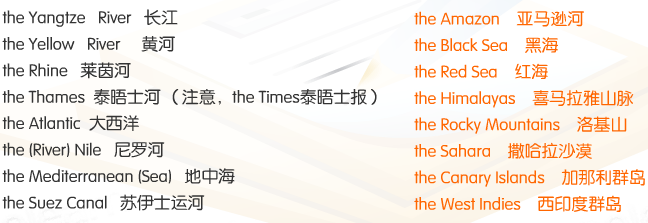
国家和地区, 单个专有名词不加, 普通名词构成的要加the
- Asia, Europe, Africa, North America, South America,
Oceania--> [,əʊsɪ'ɑːnɪə; -ʃɪ-]
- China: the People's Republic of China
- America: the United States of America
- 特殊的国家名称:The + plural names
the Netherlands荷兰 以及首都The Hague海牙 --> ['neðələndz] [heig]the Philippines菲律宾 --> ['filipi:nz; fili'pi:nz]
- 下列也不加 the
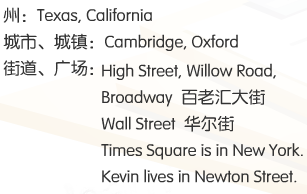
- 城市中的hotels, restaurants, pubs, cinemas, theaters, museums的名称都要the. --> /pʌb/ 酒吧

- 普通名词构成的专有名词要加the
- the Ming Dynasty 明朝
- the Great Wall
- Asia, Europe, Africa, North America, South America,
- 报纸杂志
- 报纸一般用the
- The Times 泰晤士报;
The Thames泰晤士河; --> [temz] - The Washington Post 华盛顿邮报;
The Guardian卫报(英国) --> ['gɑːdɪən] 守护者、监护人
- The Times 泰晤士报;
- 杂志名称一般不用the
- BusinessWeek 《商业周刊》
- Newsweek 《新闻周刊》 w 小写
The Economist《经济学人》
- 报纸一般用the
- 乐器、乐团、合唱团及流行团队前加the
- The Beatles
- Play/lean the guitar
- Learn the piano
- 运动项目都不用the
- play chess, play football
- 与姓氏连用, 后面姓氏加-s
- the Smiths 一是夫妇两人,或者全家
- the Bushes
- 表示强调,用The
- How many bags are you checking in?
Just the one.你要托运几个行李, 就这一个 No, no, it's for the two of us.不,不,是我们两个人
- How many bags are you checking in?
不加冠词
- 关于职业、身份、头衔 (不加a/an,则显得有档次、身份)
- 如果头衔是独一无二的,或者这个只为在一个单位是唯一的,常不加
- They appointed him
Head Librarian. 他们任命他为图书馆长。--> 头衔 - He's a librarian. --> 职业身份
He is King of the country.
- They appointed him
- 独一无二身份的,通常出现在补足语(主语补足语、宾语补足语、系动词后面)或者同位语省去the, 如果在主语或宾语位置一般会有the.
He was elected President in 1879.主语补足语- I want to see the President. 宾语
- Queen Elizabeth had dinner with President Kennedy. 伊丽莎白女王和肯尼迪总统共进晚餐。 (同位语)
- The Queen had dinner with the President.
- 独一无二头衔出现在表语位置
- John is (the) captain of the team.
- She is chariman of the committee.
- Kennedy was (the) President of the United States in 1961
- Mr. Smith used to be president of our bank.
- For the first time I am king of myself. Elect whom you choose to be king.
- 独一无二头衔出现在主语补足语位置(被动)
- Henery was elected chirman of the committee. 亨利当选为该委员会主席。
- He was elected President for the second time. 他是第二次当选总统。
- 独一无二头衔出现在宾语补足语位置
- They elected Henry chariman. 他们推选亨利为主席。
- They've appointed Fred (the) treasuer, and no doubt he will soon become (the) secretary. 他们已经推选Fred为财政司四张,毫无疑问将来他会成为财政部长。
- 独一无二的头衔出现在同位语位置
- As (the) chariman of the committee, I declare this meeting closed.
- Elizabeth II, Queen of England.
- 出现在
the posiion of, the post of , the role of后面做同位语,不加冠词。
- He has taken on the position of Head of Department.
- 如果头衔是独一无二的,或者这个只为在一个单位是唯一的,常不加
- 球类、棋类运动前不加冠词,乐器加冠词
- 限定词冠词
- 下列限定词彼此排斥,不能同时出现在名词前面
- 物主:my, your... 指示:this, those... 名词属格:Tom's, John's...
- 所有格本身可以有冠词
- the boss's wife --> [the boss]'s wife
- my brother's girlfriend --> [my brother]'s grilfriend
- 下列限定词彼此排斥,不能同时出现在名词前面
- 平行结构
- 介词
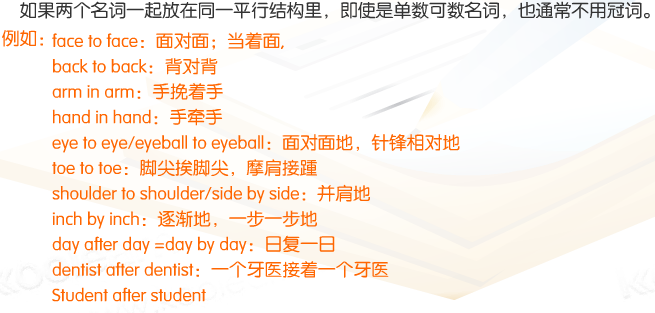
- from...to...
From Emperor to Citizen
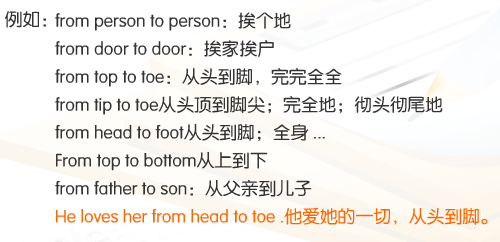
- 名词重复的短语,往往具有副词功能,在句中用作状语,修饰动词

- 介词
☆ 可加可不加,意思或用法大不同
- 住所、建筑物或社会机构类名词
- 不加冠词,表示的是人们去这些地方做在这些地方应该做的事;(前面一些娱乐场所、宾馆酒店要加the)
- 加冠词,则表示人们去这些地方不是要去与该处所密切相关的事情,而是由于其他原因 --> 强调地点
go to hosipital(as patients);in hospital住院;come out hosipital(病愈)出院,come out of the hospital (因事)从医院出来go to prision犯罪入狱; Who would want to be in prison?go to church做礼拜;be in/at church (to pray), admire the church;go to/be in town去/在城里
- 家具生活类名词
at table进餐、吃饭; at the table 在餐桌旁;在桌面- go to bed;
go to the bed走到床边
- 上学类
go to school上学; go to the school (因事)去学校in school在校念书; in the school 在学校里go to class去上课in class在上课;in the class 在这个班级go to college/university上大学- I met my girlfriend
at college. 我上大学的时候认识我女朋友的。 - I'll meet you at the college. 我们就在那个学院见面吧。
at desk在读书、做作业;at the desk 在课桌边、课桌旁
- sea
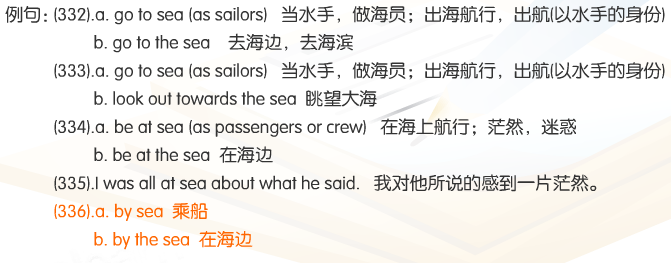
- office

其他固定短语
- 冠词修饰名词,这个名词往往具有一种抽象意义或者总称意义;有冠词修饰的名词,此时往往指特指某个事物或其他意思
- I can't pay for your dinner as I've been
in the redfor half a year. Perhaps, it will be my treat next time. 因为欠债,所以不能为你付餐费,也许下次我请客!
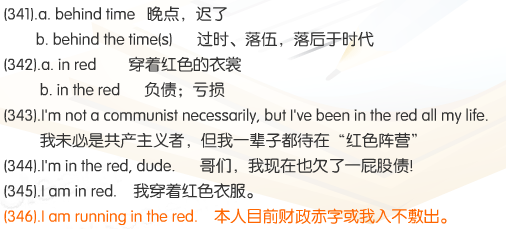
in the black盈利

by ady白天;by the day按日计算;论日 --> 以by开始表示度量的短语,一般用the
- They work only by day and get paid by the day. 他们之上白班,工资按天计算(by the hour/month)
- Do you sell eggs by the kilo or by the dozen? 鸡蛋怎么卖,是论公斤还是打?
- They sell things by the kilo in Kunming?
- Can I pay the rent by the month? No, you must pay the rent by the quarter.
in secret密密地;私下地;in the secret参与秘密;参与阴谋- in front of 在..(外部)前面; in the front of ...(内部)前面
- The tree is in front of the house, and Jhon is in the front of the house. So he can't see the tree.
take place发生;take the place (of)代替
- John took the place of Bill in the match. 约翰取代比尔参加了这个比赛。
out of question毫无问题,没有问题;out of the question完全不可能men of age成年人;men of an age同龄人keep house管理家务;keep the house守在家里
- As he wounded, he had to keep the house and sometimes kept house for his wife.
with child怀孕;with a(the) child带着孩子/和这个小孩在一起
- The gril is with the child.
特殊名词
- Nature:泛指自然界(动植物与无生命物质世界),不用冠词
- I love nature
- Enjoy nature, enjoy life, health if wealth. 享受自然,享受生活,健康才是财富
- It is diffcult to enjoy nature in the room. 欣赏大自然
- If you destory nature you will suffer for it.
- society:泛指我们在其中生活的这个社会,一般不用冠词; 若是“协会、组织、社团”则不一样。
- space:泛指星球之间的空间,意思是“宇宙、太空”,不用冠词
- There are millions of stars in space.
- I tried to park my car but
the spaceswas too small.
- man
Man can conquer nature.人定胜天- This's one small step for a man, one giant leap for mankind.
- history:泛指人类整个历史事,不用冠词
- History may repeat itself.
- Through history man has had to ...
- 关于星期
- “on Monday”指的具体时间和真是说话语境所安置的某一个时间点有联系; 也可以表示周期性的星期几,周期性的
- She left on Monday. See you on Friday
- I have English class on Monday. 我每周一都有英语课
- I was Sunday. I never get up early on Sundays. I sometiems stay in bed until lunchtime. 每逢周日(也可以不加s)
- 如果是某个星期是以上下文别的时间为参照,则要用the
- She phoned me on Wednesday and we are meeting on Friday.
- The last time I saw her was three weeks ago. She was in England for one week. She phoned me on the Wednesday and we met on the Friday. 上次见她实在三周前...她在哪个周三给我打了电话,我们在哪个周五见了面。
- They arrived on the Saturday after my birthday party. 他们实在我生日聚会之后的那个周六。
- It was a terrible week, wasn't it? Did you remember? Yes, we had snow on the Monday and floods on the Thursday! 那个周一、周四...
- She died on the Tuesday after the accident. She
died ofthe accident on Tursday.
- 用不定冠词 a 修饰
- She left on a Wednesday. 她是在一个周三离开的。
- She left on Wednesday. 她是在本周三离开的。
- They arrived on a Sunday as far as I can remember.
- We met on a wet Monday in June.
- “on Monday”指的具体时间和真是说话语境所安置的某一个时间点有联系; 也可以表示周期性的星期几,周期性的
- 关于四季
- 一般地指四季(泛泛而谈)不用the --> in spring, in summer, in autumn, in winter
- Winter is coming
- Everything seems to be born again in spring. 春天,万物复苏
- 指特定的某一年的某个季度,用the
- I first went skiing in the spring of 2008.
- That was a winter I'll never forget.
- A: When did you meet John? B: In the summer = last summer
- 一般地指四季(泛泛而谈)不用the --> in spring, in summer, in autumn, in winter
昼夜的各段时间
- at、by、after、before 不加冠词
twilight['twaɪlaɪt]
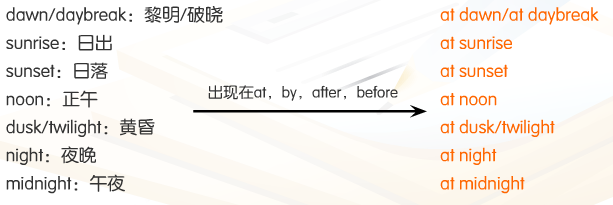
- 如果用在其他介词之后,或其他场合,则往往加冠词
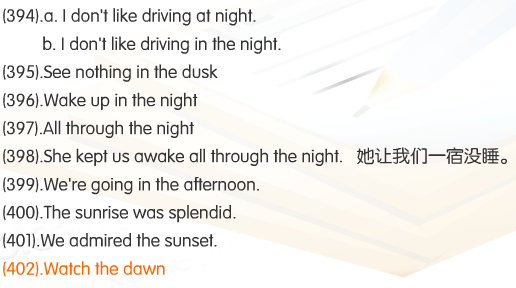
- 表示特定某一天的某个时间段,往往用定冠词,这些词前往往有形容词修饰,具体的某一天的什么时候,要用on

- at、by、after、before 不加冠词
关于进餐
- 指一般日常惯例的用餐时,通常不用冠词

- 特指提出的某一次用餐,则用the强调
- Where are we having dinner tonight? The dinner that we had last night was terrible.
- 三餐前有形容词修饰,则一般加不定冠词,来表示具体的一餐
- We had a very rich lunch.
- We didn't get up until 10 o'clock and had a late breakfast.
- We often have a big lunch and a nice dinner. 午饭较多,晚饭较少
- 因为某个特殊事件而通过吃饭来庆祝或款待某人,加冠词
- We're having a dinner to welcome the new manager. 接风洗尘
- 指一般日常惯例的用餐时,通常不用冠词
- 交通工具,接在by之后的交通工具名字,其前不用冠词,但这些名词在其他场合要接冠词。但“步行”
on foot
- by train; take the train
- by plane; be on the plane
- by bicycle; take the bicycle
- by bus; be on the bus
- by car; be in the car
- by boat; take the boat
- 通讯工具, 在by之后不用冠词,其他的要
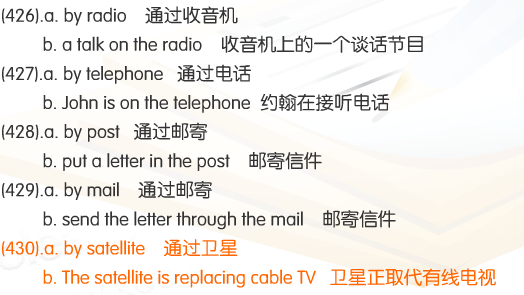
- Nature:泛指自然界(动植物与无生命物质世界),不用冠词
总结
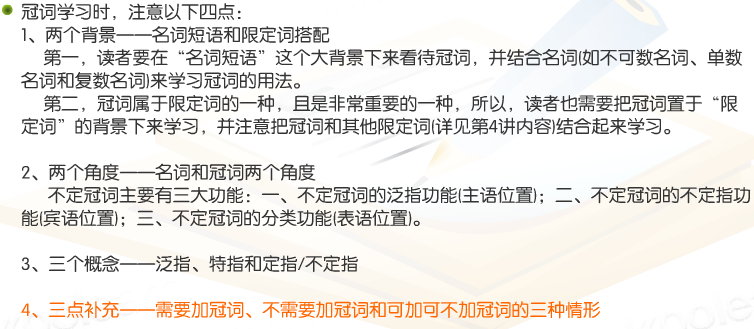
4. 一般现在时
表示事实、真理、观点

一般习惯性动作
- 表示习惯的动作
- The Olympic Games take place every four years.
- I go to the gym twice a week.
- 表示习惯状态 --> be动词后,实意动词前; 副词一般放在否定助词前,但always除外
- 肯定的频度副词:always, frequently ,usually, sometimes,generally, occasionally, often
- 否定的频度副词:never, seldom ,rarely
- 频率的副词短语:once a week, twice a week,
on alternate days等等
He is always late.
He always goes to school by bike.
The history lectures sometimes aren't interesting.
His wife complains that he sometimes dosen't listen to her.
He dosen't always leave before 6'clock. Sometimes he works until 7 o'clock.
- 一般现在时 && 现在完成进行时
- I swim 1000 meters every afternoon. && I have been swimming 1000 meters every afternoon. 我每天下午游一千米(过去、现在、将来)。&& 现在完成进行时,(到目前为止一直是,将来不是)
- I run a mile every afternoon 我每天下午跑一公里。 I have been running a mile every afternoon。 到目前为止,我每天下午都是跑一公里
It always seems hard when you are just starting out.
正在发生的动作
- 以there或here开头的句子
Here comes your wife.你老婆来了- Your wife is coming. 你老婆很快就来了
There goes our bus; we'll have to wait for the next one.
- 表示现在瞬间的动作,“边说边做”
- 动作解说,如球赛解说
- 剧情介绍
The woman is a spy, now she enters the room, opens the drawer, takes out apistolandslips it intoher packet. 这个女间谍,现在他走进房间,打开抽屉, 拿出手枪悄悄地塞进衣袋口。--> ['pɪst(ə)l] - 示范动作
I take two eggs,beatthem , thenmix in the flour. --> ['flaʊə]
将来发生的动作
- 条件或时间状语从句中表示将来动作
- if, unless, in case, provided... when, as soon as, before, after, until... --> 主将从现
- A: When are you coming down, young man? B: When you go away! 你打算什么时候下来?等你走之后
- 时间从句
owe
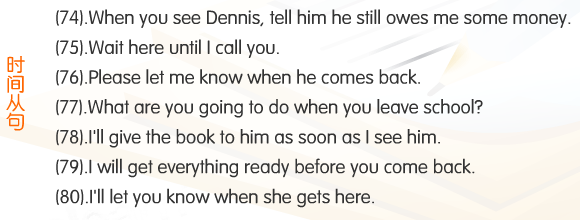

- 定语或名词从句中表示将来动作 (主从不同,将+现在, 现在+将)

- ☆ 一般现在时谈将来的正式安排
- 表示交通时间的安排

- 表示娱乐节目的安排
What time does the film begin? - 表示已定好的计划安排
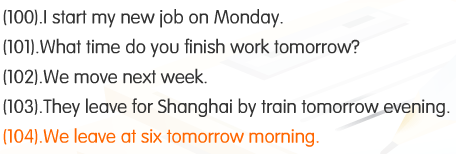
- 未来的工作安排
I begin to work at the Swan Laundry on Monday?
My daughter gets married at there o'clock in St Mary's Church on Saturday.
- 表示交通时间的安排
过去发生的动作
- 口语中,用一般现在时态讲故事,显得生动。

Constant dripping wear away a stone. 滴水穿石
Jhon dosen't always go to school late. That is to say, he sometimes attend shcool late. Heis generallya good student. He is always ready to help others.
Why don't youpop him the question? 为什么你不向他求婚呢?
The front page of a newspaper contains the most important news of the day.
A: Look! It is snowing.
B: It's wonderful! It dosen't snow in my hometown.
5. 一般过去时
导入
- San Francisco Was 旧金山已成过去
- Afghanistan: The Land that Was 阿富汗:失去的圣土
Was $47Now 38$原价
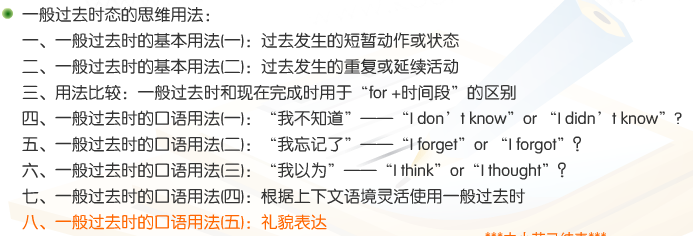
基本用法
- 过去发生的短暂动作或状态, 常和时间状语连用
时间状语:last night, the night before last, three days/months/years ago, last spring (不加冠词)
- He was late for school this morning. 状态
- I was tried last night, so I went to bed early. 状态, 动作
英国 lift; 美国 elevator
- 过去发生的重复或延续动作
- I slept for eight hours last night.
- She lived in our town for three years, but now she is living in Beijing.
- I lived in the country for ten years. (过去已经结束了)
- 一般过去时和现在完成时用于 “for + 时间段”
- She lived in our town for three years. (但现在不在这里,默认有个 but)
- She has lived in our town for three years. (现在还在这里,并可能还是延续下去)

口语用法
- I didn't know. && I don't know.
- Oh, hi, Tom. I didn't think you were also here. 我没想到你也在这里(前后状态一致)
I didn't realizeyou could hear it. 我没想到你能听得见I knew you would come.我早知道你回来的- I knew you would win the match. 我就知道你会赢的
- I forget. && I forgot
- I forgot to bring your book back.
- I forget the meaning of the word.
I am sorry I forgot totell you that...- Oh, I almost forgot. Just one more thing... 我差点忘记了
英文中一般都说成"I forgot to do ..."
I think && I thought
- 表示“本以为……, 原来不是”


- 表示“我当时就这么认为……,果真如此”

- I thought it was you. 有歧义(我刚才就觉得是你!/我本来以为是你!)
- 礼貌提意见或请求,此时并不表示过去时间
I thought we could meet for dinner tomorrow.
- 表示“本以为……, 原来不是”
灵活运用
- 对感刚刚结束的活动发表评论,通常使用一般过去时
These were truly exceptional Games.这真是一届无与伦比的奥运会!
Did you like him?(针对刚才他的演唱)你喜欢他妈?
Hey, that was fun.Thanks for the lesson!(活动结束之后,评论)
It was nice meeting you!Nice meeting you!
It was nice talking to you!Nice talking to you!
It is nice to meet you!
Excuese me. I believeI was here first. Do you mind waiting your turn? 我先来
- 对感刚刚结束的活动发表评论,通常使用一般过去时
礼貌表达
- I wondered if you could help me?
- Did you want to sit down and stay a while? 礼貌
- I'm calling because I wanted to ask you a favor.
- What sort of price did you have in mind?
6. 一般将来时
导入
- 一般将来时,表示将来发生的事情。(预测、意图打算、计划)

- will do 本质上只是情态动词will的一种用法

- 常常用 be going to 来谈论将来的事件
预测
- will
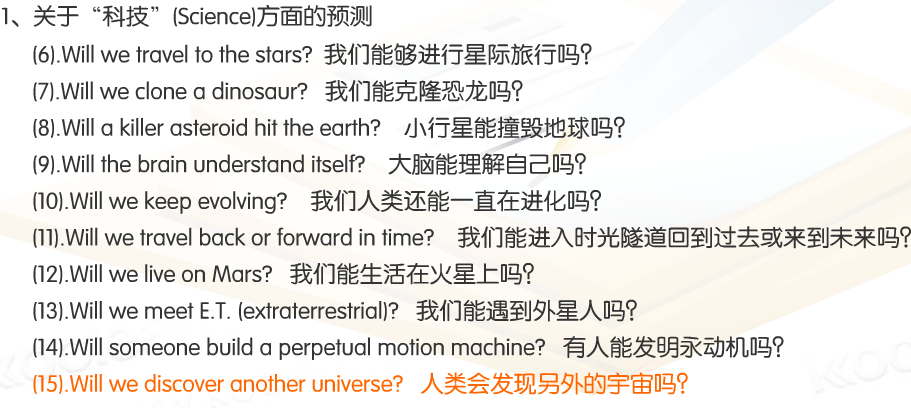

- be going to
- I am afraid that I am going to end up like him, the way he did. 恐怕我也会像他那样结束生命,用他的方式。
- Look at those black clouds! It's goting to rain.
比较、区别
- be going to 比 will 有更多的证据支持,且发生的事件更近
be going to 是一个时态的形式,表示将来的预测往往暗示与“现在”有联系而且说话不久之后即将发生。

be going to 还往往表示当前已有迹象表明说话者无力控制的即将发生的行为。

will 只是表明说话人认为或相信某件事情会发生

常与will连用的表达方式包括:maybe, I guess, I suppose, probaly, I think, I bet, I'm sure等这些不确定的用语,以表达不肯定的猜想。
I guess I'll paly tennis.
Think it will rain? I'm sure it won't.will 用于存在某种条件下某事才发生。所以,在有条件或时间从句的主语中我们通常用will表示预测,而不是be going to
If the crop fails, there will be afamine. ['fæmɪn]
You'll feel better when you take this medicine.在同一个句子中差别
I'm going to sick. / I will be sick. (前者I feel terrible, 后者附加在另一个条件之上,如eat ice cream)
The bridge is going to collapse. / The bridge will collapse.

Will you meet me at the show this Friday? will用语请求和邀请
打算(蓄谋已久)be going to
be going to 表示主语已经决定做某事
I am going to do something. 相当于I have decided to do it. 或者 my intention is to do it.
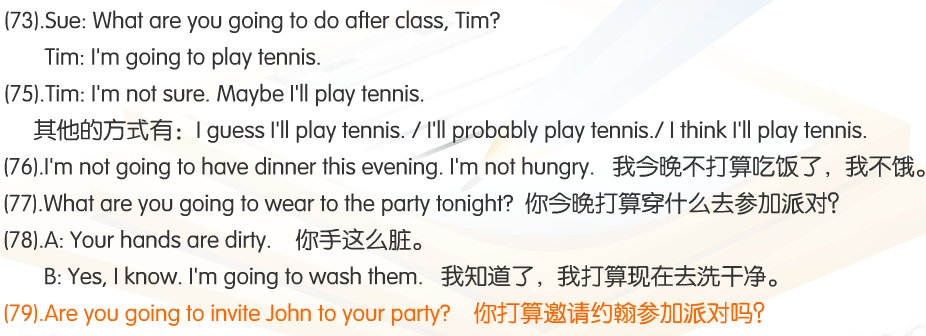
be going to 表示“打算”,需要用“人”做主语。但表示测试,主语可以是人称或非人称。
预测是说话人的预测
打算是主语的打算表示“决心”时具有强烈的感情色彩
- We are going to become the world's leading forwarding company. 我们一定要成为世界上最大的快运公司。
You're gonna be sorry!You're gonna be so sorry! 你一定得后悔,我决饶不了你。
意愿(当机立断)will
- 不是事先计划好的(unplaned),是当机立断(
spontaneous decision)
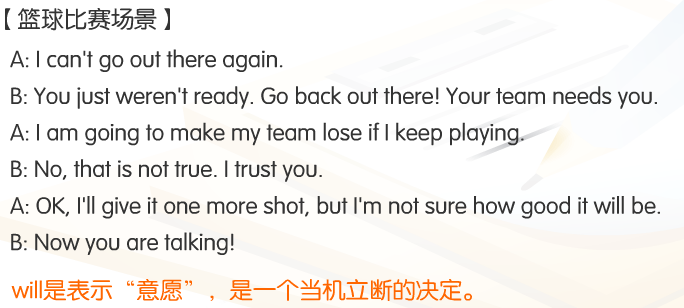
The telephone is ringing. -- I'll get it.


比较(打算 && 意愿)
- 主要差别
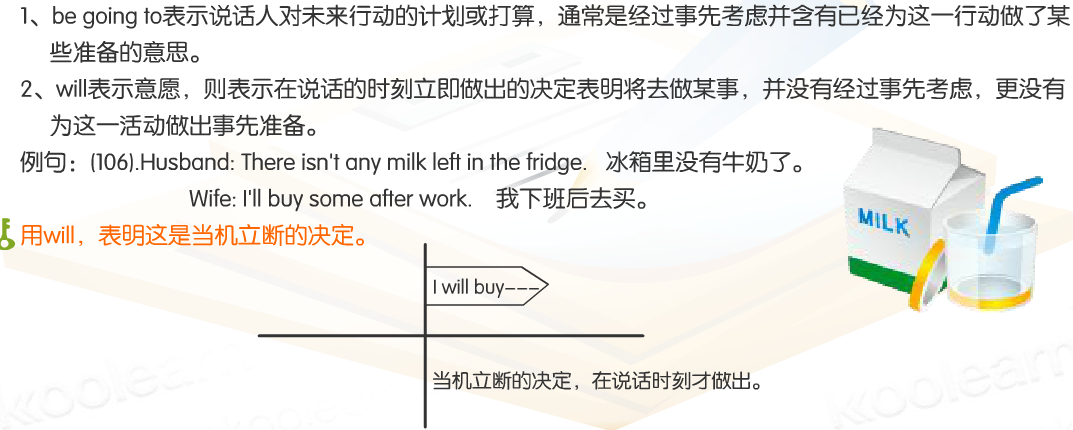

- 总结

7. 进行时
- 构成形式
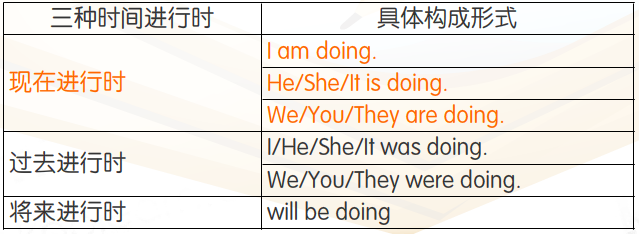
- 暗示正在发生
- You're standing on my food. 你踩到我的脚了
- I'm sorry. I wasn't concentrating. I was think aoubt him. 我刚走神了,我刚正在想
- 使用语境

- 现在进行时并不总是表示正在发生的动作!!

一、现在进行时
说话时刻正在进行的动作(exactly now)
What does it look like I am doing?
目前一段时期内持续的一种短暂过程(around now)
- What are you doing these days?
- 现在进行时 && 一般现在时区别






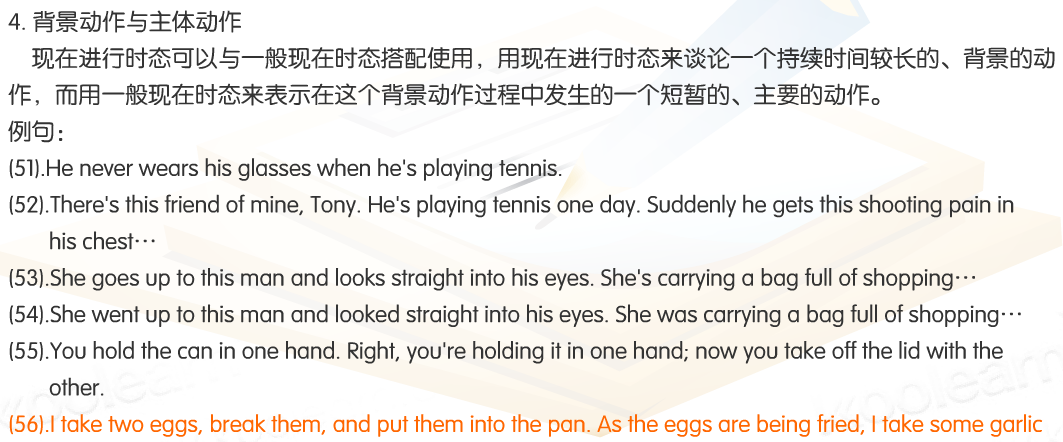
用于表示“改变”的动作,强调“逐渐变化”的过程
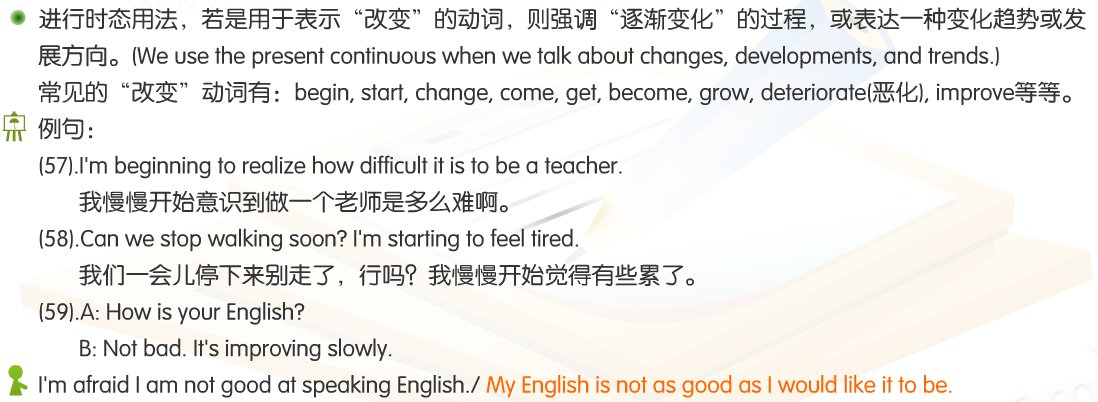



用于表达强烈感情色彩
- 常用句型
- I'm saying that...
- You're saying that ...
- What I am saying is that ...
- I'm telling you ...
- 并不是为了说明动作在说话的时刻进行,而是为了强调说话人在陈述和强调自己的观点,具有强烈的感情色彩。


表示将来确定的安排
- 口语用法


- be doing && be going to
- be doing 比 be going to 更加确定



- be doing 不能用来表示预测,其重在安排 definate arrangement
预测未来一个不可控制的事件也要用be going to
I think is going to rain / will rain.
We are going to win the tennis match next weekend. - be doing 表示将来安排时必须是人做主语
The tree is falling tomorrow.(X)
The tree is going to fall tomorrow.(预测) - be doing 不能用来谈论将来恒久的安排


- be doing 比 be going to 更加确定
与always等连用,表示多次重复,且含有感情色彩




翻译
- I'm doing my laundry. you?
- I could find you in the TV lounge? What does it look like I am doing? 你瞧我正在干嘛了?/你看我在干嘛了?
How are you geting along withyour English? 你英语学的怎么样? I'm coming along. 在慢慢提高- I am putting away half my pay each month. 我每月把我一般的薪水存起来。
- I'm letting my hair grow。 我要让头发更长。
- He drives a taxi, but he is not drving a taxi. 他是开出租出的,但是现在不在开。
- I'm doing some cleaning.
- How is your English? Not bad. It's improving slowly.
- I am afraid I am not good at speaking English. / My English in not as good as I would like to be. / My English would be better.
- I go swimming in the evenings to try to lose weight.
- I'm not telling you.
- What are we waiting for then? Let's get started.
- I'm not having this conversation with you. 我不跟你说了。
- You're not backing out of our date, are you? 你该不是不想和我约会吧?
- I'm 2 minutes late... You're making this into a bigger deal than it is. 你可真是小题大做
- She's keeping her name.
- I'm taking a makeup test tomorrow?
- He's always pulling my leg. 他老是开我玩笑。
- They're constantly having parties until the early hours of the morning.
- You're continually changing your mind.
二、过去进行时
设置故事背景
- 过去进行时通常表示一个历时较长的体现“背景”的动作或状态;短暂动作则用过去式!
- Tom burnt his hand when he was cooking the dinner.
- While I was working in the garden,I hurt my back
- 动作长短是相对的:相对短的动作用过去时,相对长的用过去进行时
- I was walking past the car when it
exploded. --> [ɪk'spləʊdɪd] - One of your apples fell down when I was passing your garden so I put it back for you!
- She
slippedand hurt herself while she wasgetting offthe bus. - Mary dropped her bag while she was getting into her car.
- I was cooking dinner last night when I cut my finger.
- I was telephoning Harry when she arrived. 她到的时候我正在给Harry打电话。
- I telephoned Harry when she arrived. 她到了之后,我再给Harry打电话。
- I was walking past the car when it
- when && while
- when后接短动作(一般过去时), 后接长动作(进行时);while 只能接长动作(过去进行时)
- The car exploded when/while I was walking past it.
- I was walking past the car when it exploded.
- 可以不用while/when引导从句
- I saw you in the park yesterday. You were sitting on the grass and reading a book.
- She went up to this man and looked straight into his eyes. She was carrying a bag full of shopping...
- Mary broke her arm last week. It happened when she was painting her room. She fell off the
ladder.
- when后接短动作(一般过去时), 后接长动作(进行时);while 只能接长动作(过去进行时)
少见用法:两个过去同时在持续的动作
- 若都是长动作,则都用过去进行时
- While I was studying in my room, my roommates were talking loundly with their friends.
- 若都是短暂动作,则用一般过去时
- When the taxi came I put my suitcase on the back seat.
- She
got upwhen the alarm clockwent off. - She was getting up when the alarm clock went off.
- I was reading to my children while my wife was washing up.
- ...when someone rang the
doorbell... I answered the door... I was taking a shower.gold bar... the divers were filming life on acoral reefwhen suddenly they found the gold. --> 珊瑚礁 ['kɒr(ə)l] [riːf]- What an awful story! A couple was sailing their
yachtfrom A to B... --> 游艇[jɒt]
描述一个过去特定的时刻正在发生的事情
- What were you doing at 10 last night? I was doing my laundry.
- At the time of robbery, what are you doing?
- A
motoristwasin court for speeding. 摩托车司机因为超速被告了。
Do you have any idea how fast you were going? 你知道你开的多开吗?I'm not sure, but I think I was going about 35.
口语表达中,表示委婉的请求或提议
- 表示态度的名词:wonder, hope, think
- I was hoping to talk to you about my class project for economics.
- Why don't you come and see me during
office hourstomorrow. 辅导时间 - I was wondering if you'd like to lend me your car.
- I was thinking if you'd like to lend me your car.
三、将来进行时
- He won't come --> He won't be coming.
- I'll see her this evening --> I'll be seeing her this evening.
将来某一特定时刻正在发生的事件
- Tomorrow afternoon we're going to play tennis
from 3 o'clock until 5 o'clock. So at 4 o'clock, we will be palying tennis. - Just think,
two days from nowI will be lying on the beach in the sun. 两天后我将在沙滩上晒太阳。 - Can we meet tomorrow afternoon?
Not in the afternoon.I will be working. Don't telephone meafter eight tomorrow.
Wait until seven o'clockso thatthey won't still be eating. 那时他们不在吃饭.- Do you think you will still be working here
in two years' time? 两年之后 By the time next year, I will be writing my essay... 明年这个时候
事先安排好要做的事件(previous arrangement)或者一个惯例
- Professer Smith
will be giving a lectureon the American literature tomorrow evening. - He will be
taking up his placeat university in September. 九月份他就将上大学。 As usal, the police will have a difficult time. 同往常一样,警察的日子将不好过...It is always the same on these occasions.每逢这种场合,情况都是这样的。- I'll be seeing Tony on Tueseday.
That's when we usually meet.我们通常那时候见面。 - I'll be seeing her this evening... 我今晚就会见到她...
- Soon
the dayswill be getting longer and warmer. I'm really looking forward to that. 不久之后,白天会变得越来越长、越来越暖和。 - Everybody will be watching anxiously as the new buildings
go up. 大家都将急切注视着新建筑的建成。--> ['æŋkʃəsli]
be doing && will be doing 表示将来安排好的事情,两种时态可以互换。
I'm taking her tothe Forbidden City紫禁城
不同:
1) 现在进行时指标是最近的将来;将来进行时可表示最近或者较远的安排。 I am meeting... I will be meeting...
2) 现在进行时表示最近将来的动作时,必须要有确定的将来时间状语。(歧义)
3)现在进行时可以用来谈论令人惊讶的、意外的活动,将来时不行!!! Have you heard the news? Dr.Smith is leaving! XX将要离开了
表示背景动作(少用)
在这个背景动作下,将会发生另一个短暂动作
1. They probably will be watching TV when we get there. 等我们一会儿到那儿时,他们可能正在看电视。
2. If we don't hurry, the musicians will be palying by the time we arrive. 一会儿到那儿时... --> [mjuː'zɪʃ(ə)n]
☆ 表示客观将来,避免与表示“意愿”的will do混用 (难点)
陈述句中的差异:will do较主观,表示决定、意愿、要求、承诺等;will be doing 较客观,主要表示实现的安排或惯例活动。
- I guess Bob and Amy
won't be comingto the party. (won't come<--> refuse to do ) 客观来不了。 - If I fail to show up by 7 o'clock,
I will not be coming at all. 如果... 我就压根来不了了。 - Sure. I'll be seeing her this evening. 我今晚就会见到她。I'll see her this evening. (我刚刚决定)
- Won't we be blocking people's ways then? (客观)
- People will be pushing me? (客观, 非主观)
- I'll
be joining youin half an hour. 半小时后我就会去找你; I'll join you in half an hour. 那好,我半小时后来找你。 - Mary
won't be payingthis bill. 我想玛丽不会付账的; Mary won't pay this bill. 玛丽不愿意付账,她拒绝付账。 - He
won't be resigning. 我想他不会辞职;He won't resign.
☆ 礼貌地询问(有时带有目的性)(难点)
- Will you be doing...? 用来礼貌地询问对方的安排,显得比一般将来时will do 更委婉客气。
- How will you be paying for this? (... will you pay for this... 你到底)
- How long will you be staying... how will you be paying...
- Will you be staying in England?
- Will you be doing...? 在询问对方安排时, 有时带有目的性
- Will be using your
lawnmowerthis afternoon? 割草机 --> ['lɔːnməʊə] - Are you starting work on the room today? 你今天就开始收拾这个房间吗? Will you be starting work on the room today? 您是今天就要收拾这个房间吗?
- What time are you coming to baby-sit? What time will you be coming to baby-sit?We have to be at the theater by 7 o'clock.
- I need some stamps.
Could you get me some? - Will you be seeing Laura tomorrow? Yes, probally. Why?你明天能碰到罗拉吗?
- Will be using your
Will you be doing...? 不用来表示“请求”; will you do 本身表请求!
- Will you lend me ten dollars?
Will you be lending me ... - Will you be staying in this evening? 今晚您不出去吧? Will you stay in this evening? 今晚你别处去了,好吗?/今晚你不要再出门了行不行?
- Will you be staying in this evening? I need your help with my English. / Will you stay in this evening?
- Will you be seeing Laura tomorrow? 你明天能碰到劳拉吗?(不是请求,后面接的内容可能是请求) / Will you see Laura tomorrow? 你明天能来看看劳拉吗(本身是请求)
在英文中,will 往往用来表示“意愿(willingness)”-->现在是否愿意将来做某事-->现在的状态,所有不能用
will be doing; will 与进行时态be doing 连用一般是表示“推测”
- Will you lend me ten dollars?
Will be doing 可用于其他人称,来进行礼貌询
- Who will be I acting with? 请问我要和谁演对手戏呢?
- When will she be contacing me? (礼貌)/ When will she contact me? 她什么时候联系我啊?
